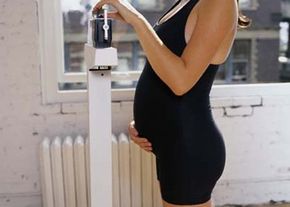What and how much should you eat to be healthy during pregnancy? You want to pay special attention to certain nutrients and add about 300 extra calories to your diet. The average recommended daily caloric intake varies depending on your activity level and normal weight. Your weight gain is a good guide to how well you are meeting your caloric intake.
Protein
You should increase your protein intake to 60 grams during pregnancy to provide for the growth of your baby and your breasts, uterus, and placenta; for the increased blood volume; and for the production of amniotic fluid.
Iron
Iron is an important nutrient during pregnancy for three primary reasons. First, iron is necessary for the formation of maternal and fetal hemoglobin, the oxygen-carrying component of blood. Since your blood volume increases considerably during pregnancy and your baby is manufacturing blood cells, too, your need for iron increases. Second, during the last trimester, your baby draws from you some of the iron reserves that help prevent anemia during the first four to six months of your baby's life. Third, your increased blood volume and iron stores help your body adjust (to some degree) to the blood loss that occurs during childbirth.
If your doctor recommends an iron supplement, it will probably contain 60 milligrams of iron, although the recommended amount during pregnancy is 27 milligrams a day. Because iron from supplements is not totally absorbed, you must ingest about 60 milligrams of iron to ensure that you actually absorb the recommended daily amount of 27 milligrams.
Iron supplements are best absorbed if taken with foods rich in vitamin C, such as orange, grapefruit, or tomato juice. Absorption is impaired if you take them with antacids or calcium-containing foods, such as milk and cheese. Iron supplements sometimes cause an upset stomach, constipation, or nausea. If that is the case for you, remember that you can get much of the iron you need from iron-rich foods, such as organ meats, red meat, egg yolk, and legumes (dried peas and beans). Consult your doctor before stopping an iron supplement, however.
Calcium
During pregnancy, many doctors commonly recommend that you get between 1,200 and 1,500 milligrams of calcium per day. Calcium is essential for the development and growth of your baby's skeleton, heart, muscles, and tooth buds. Inadequate intake results in depletion of your own stores of calcium.
Milk and milk products (such as yogurt and cheese) are the best sources of dietary calcium. Tofu and canned whole fish (with bones) are good secondary sources. If you are lactose intolerant, meaning you cannot digest the lactose found in milk products, try a reduced-lactose or lactose-free milk product, soy milk, acidophilus milk, buttermilk, or cultured yogurt. If all else fails, your doctor may prescribe a calcium supplement.
Vitamins
The recommended daily intake of nearly all vitamins increases 25 to 50 percent for pregnant women. The daily recommendation for folic acid (folate) doubles. A high-quality, varied diet will supply most of the vitamins you need, with the probable exception of folic acid. Folic acid supplements of 400 micrograms are usually recommended to provide for the increased folic acid requirement.
Folic acid is important for synthesis of all cells and for production of DNA and RNA, the building blocks of cells. Deficiency can cause megaloblastic anemia (development of abnormal red blood cells) in the mother and neural tube defects in the fetus.
Since adequate folic acid intake is so important for your baby and you, choose a diet high in foods containing this essential vitamin. Liver, lean beef, legumes, egg yolks, and dark green leafy vegetables are good food sources of folic acid.
General Guidelines
Use the freshest foods you can, choose a varied, high-quality diet, and prepare the foods carefully to ensure you get the most nutritional value from your food. Vitamins, especially the water-soluble vitamins (folic acid, niacin, vitamin C, and the B vitamins), are easily destroyed by overcooking. Uncooked vegetables and fruits have the highest vitamin content. Next best is to use very little or no water to cook and to cook for a very short time.
For many of us, daily meal planning takes place in the grocery store as we choose the foods that are the best buys and the most appealing. One trick to healthy shopping is to choose foods mostly from the perimeter of the store, in other words, where you find the fruits, vegetables, meats, and dairy products. The inner aisles contain the breads and grains you need, but try to avoid the heavily processed and highly salted foods you see. And remember: Often, foods that are more convenient fall short in nutrient density.
It is important to note that consuming excess amounts of supplements of certain nutrients, particularly vitamins A and D, iodine, and zinc, may produce toxic effects and congenital anomalies (birth defects).
To keep track of the foods you eat and to ensure you and your baby get all the essential nutrients you need, consider keeping a food diary periodically throughout your pregnancy. Record your daily intake of dairy, protein, grains and breads, fruits and vegetables, fats, fluids, and foods consisting primarily of nonnutritious calories (simple sugars). After several days, assess where you need to make changes in order to get the nutrients you need. If you find it difficult to eat a well balanced, healthy diet, talk with your doctor about how you can improve your eating habits, or consult a nutritionist.
Sometimes your capacity or appetite is diminished, especially during late pregnancy or if you experience heartburn or nausea. Eat several small meals during the day instead of three large meals to help you get the nutrients you and your baby need. Talk with your doctor about any concerns you have about the amount of food you need.
Some doctors prescribe prenatal vitamins, while others may prescribe only folic acid supplements or iron supplements. Remember that these supplements are not a substitute for a good diet. They supply only some of the nutrients needed for health. The rest you must get from food. There are also foods and harmful things to avoid during pregnancy. We'll learn about these in the next section.
This information is solely for informational purposes. IT IS NOT INTENDED TO PROVIDE MEDICAL ADVICE. Neither the Editors of Consumer Guide (R), Publications International, Ltd., the author nor publisher take responsibility for any possible consequences from any treatment, procedure, exercise, dietary modification, action or application of medication which results from reading or following the information contained in this information. The publication of this information does not constitute the practice of medicine, and this information does not replace the advice of your physician or other health care provider. Before undertaking any course of treatment, the reader must seek the advice of their physician or other health care provider.




